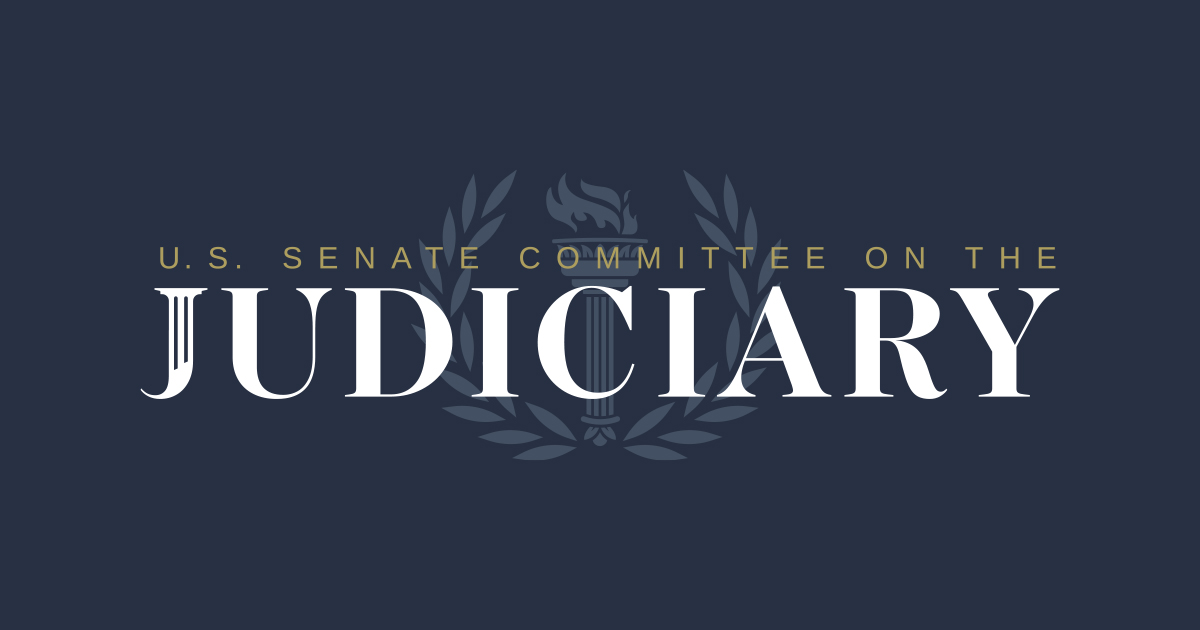## From Policy to Power-Ups: Senate Judiciary Committee Takes on the Gaming Industry
Forget Pac-Man chomping ghosts – in the real world, the high-stakes battleground is a Senate hearing room. Today, the Senate Judiciary Committee is hosting an “Executive Business Meeting,” and the gaming industry is on the hot seat.

Think of this: your favorite game, the sprawling worlds you explore, the characters you command – all under the scrutiny of lawmakers.
This isn’t about pixelated polygons, folks. This is about real-world implications: from addiction concerns to online safety, big tech monopolies to the future of esports, the very foundations of the gaming world are being debated.

Jurisdiction and Authority: What Powers Does the Committee Hold?
The Senate Judiciary Committee’s vast jurisdiction encompasses a wide array of legal matters, including those directly impacting the gaming industry. Understanding its powers is crucial for navigating the complex regulatory landscape surrounding games.
Areas of Law Under the Committee’s Purview
The Committee’s purview extends to numerous areas of law, some of which directly intersect with gaming, including:
- Antitrust Law: The Committee scrutinizes potential monopolies and unfair competition within industries, including gaming.
- Intellectual Property Law: The Committee addresses issues related to copyright, trademark, and patent protection, which are critical for game developers and publishers.
- Consumer Protection Law: The Committee investigates consumer fraud and ensures fair practices within the gaming industry, safeguarding players’ interests.
- Data Privacy and Security: As gaming increasingly relies on online platforms and user data, the Committee plays a role in shaping legislation protecting player privacy and security.
- Hold hearings: The Committee conducts public hearings to gather information on proposed gaming-related legislation, allowing stakeholders to voice their opinions and concerns.
- Draft legislation: Committee members can introduce and draft bills that impact gaming regulations and policies.
- Mark up bills: The Committee can amend and revise bills before they are sent to the full Senate for a vote.
- Online Gambling: The Committee has been involved in shaping legislation regarding the legality and regulation of online gambling platforms.
- Esports: As esports grows in popularity, the Committee’s purview may encompass issues related to fair play, anti-doping, and intellectual property rights in esports.
- Video Game Content: The Committee may address concerns about the content of video games, particularly regarding violence and its potential impact on youth.
Legislative Process and Bill Consideration
The Senate Judiciary Committee wields significant influence in the legislative process. It has the power to:
Impact on Gaming Regulations and Policy
The Committee’s decisions and actions have a profound impact on the development and implementation of gaming regulations and policies. Its oversight extends to:
Past Decisions and Precedents: Learning from History
Examining the Committee’s past decisions and precedents provides valuable insights into its approach to gaming-related issues and helps predict future trends.
Landmark Cases and Their Lasting Effects on Gaming
Several landmark cases have shaped the legal landscape surrounding gaming, with the Senate Judiciary Committee playing a role in their development. For example:
- United States v. Miller (1976): This case established the legality of wagering on sporting events, paving the way for the growth of the sports betting industry. While not directly involving the Committee, the ruling influenced subsequent legislative efforts in gaming.
- Internet Gambling Prohibition Act (1999): This bill, though ultimately unsuccessful, demonstrated the Committee’s early interest in regulating online gambling and highlighted the challenges of balancing states’ rights with federal oversight.
- Increased regulation of online gaming: As online gaming continues to grow, lawmakers may introduce more stringent regulations to address issues such as consumer protection, data privacy, and responsible gaming.
- Expansion of legal sports betting: The Supreme Court’s decision in Murphy v. NCAA (2018) paved the way for legal sports betting in more states. The Committee may be involved in shaping federal and state policies related to this growing industry.
- Addressing the impact of video games on youth: Concerns about the potential negative effects of video game content, particularly violence, may lead to increased scrutiny and potential regulation of the gaming industry.
Evolution of Gaming Law and Policy Over Time
Over the years, gaming law and policy have evolved significantly. The rise of online gaming, the legalization of sports betting in some states, and the increasing popularity of esports have all contributed to this evolution. The Committee has played a role in shaping these changes through hearings, investigations, and legislative proposals.
Identifying Trends and Potential Future Developments
By analyzing past decisions and current trends, we can identify potential future developments in gaming law and policy. Some key trends to watch include:
The Public Eye: Transparency and Accessibility
The Senate Judiciary Committee operates under a principle of transparency and accessibility, ensuring public participation and engagement in the legislative process.
How to Access Committee Documents and Recordings
Gamestanza encourages its readers to engage with the Committee’s work by accessing its public records. This information is readily available through the Committee’s website, which includes:
- Hearing transcripts: Detailed records of public hearings on gaming-related issues.
- Committee reports: In-depth analyses of gaming laws and policies.
- Legislative proposals: Drafts of bills and amendments related to gaming.
- Video recordings of hearings: Allowing for direct observation of Committee proceedings.
- Attend hearings: Witness firsthand the discussions and debates surrounding gaming-related legislation.
- Submit written testimony: Share their views and expertise with the Committee members.
- Contact their senators: Advocate for policies that support the interests of the gaming community.
- Promote responsible gaming practices: Advocate for policies that address problem gambling and protect vulnerable populations.
- Support fair competition and innovation: Encourage legislation that fosters a healthy and competitive gaming market.
- Protect intellectual property rights: Ensure that game developers and publishers are adequately protected.
- Promote access to gaming for all: Advocate for policies that ensure that everyone has the opportunity to enjoy gaming.
Importance of Public Participation and Engagement
Public participation is crucial for ensuring that the Committee’s decisions reflect the diverse perspectives of stakeholders within the gaming community.
Gamestanza strongly encourages its readers to:
Opportunities for Gamers to Make Their Voices Heard
Gamers have a vested interest in shaping the legal landscape surrounding their beloved hobby. By engaging with the Senate Judiciary Committee, they can:
Conclusion
So, the Senate Judiciary Committee just dropped a massive bomb on the gaming world. They’re taking a serious look at the dark side of loot boxes, those digital treasure chests that have become a controversial cornerstone of many popular games. The committee’s main argument? These mechanics are preying on vulnerable players, particularly children, and blurring the lines between entertainment and gambling. They’ve called for stricter regulations, echoing the concerns of parents, lawmakers, and even some game developers themselves. This isn’t just about protecting wallets, folks. This is about protecting our minds. If we allow loot boxes to continue unchecked, we risk normalizing addictive and potentially harmful gambling behavior, especially among young players whose brains are still developing. The gaming industry is facing a crossroads. Will they push back against this scrutiny, clinging to the lucrative allure of loot boxes? Or will they step up, embrace responsibility, and work with lawmakers to create a safer, fairer gaming environment for everyone? The stakes are high, and the future of gaming hangs in the balance. The Senate has spoken, now it’s time for the industry to listen.
